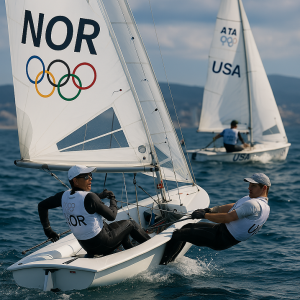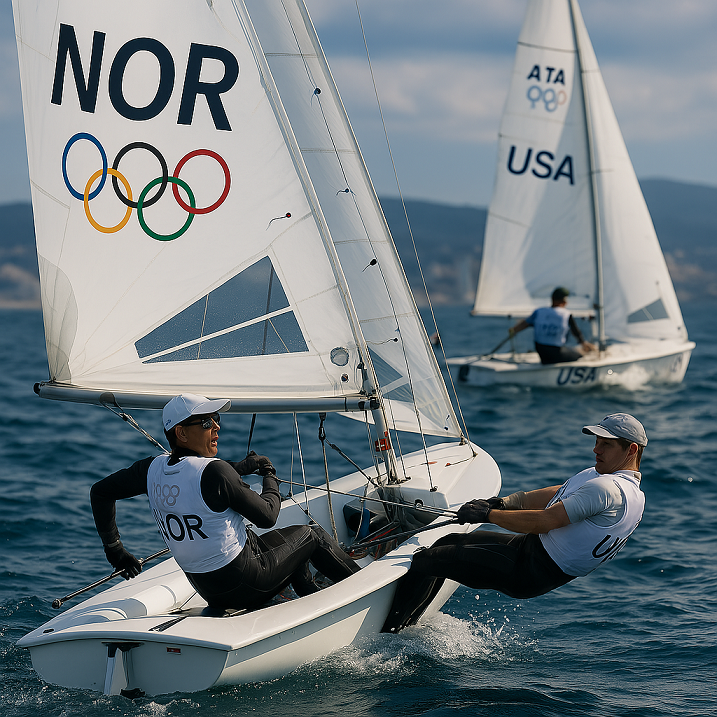Discover how Olympic sailing events at the 2024 Paris Olympics reflect advanced maritime skills—from navigation to teamwork—highlighting the vital connection between sports and the maritime profession.

What Do Sailing and Seamanship Have in Common?
As the world turns its eyes to the 2024 Paris Olympics, one of the most dynamic and technical sports—Olympic Sailing—offers more than thrilling races. It presents a real-world demonstration of essential maritime skills such as navigation, meteorology, vessel handling, teamwork, and resilience. These are the very skills that maritime students, cadets, and professionals are trained to master.
So, how exactly do Olympic sailing events mirror the expertise needed in maritime industries? Let’s explore.
Key Concepts: Understanding Olympic Sailing at Paris 2024
⛵ What Is Olympic Sailing?
Also known as Olympic Yachting, sailing has been a part of the Olympic Games since 1900. In the 2024 Paris Olympics, sailing events will be held in Marseille, utilizing the Mediterranean’s challenging wind and water conditions.
⛳ Events and Classes in 2024
Paris 2024 will feature 10 sailing disciplines, including:
-
iQFOiL (windsurfing with hydrofoil)
-
ILCA 6 & ILCA 7 (single-person dinghies)
-
470 Mixed (two-person mixed gender dinghy)
-
49er & 49erFX (high-speed skiffs)
-
Nacra 17 (mixed multihull with foiling capabilities)
-
Formula Kite (kiteboarding)
Each event demands different levels of maritime and physical skills.
Maritime Skills Demonstrated in Olympic Sailing
⚓ 1. Vessel Handling and Balance
Just like a ship officer must understand how to maneuver large vessels, Olympic sailors must:
-
Adjust sail positions
-
Control tiller and rudder
-
Maintain vessel stability even at high speed
These actions require acute hydrodynamic understanding—a fundamental in marine engineering and naval architecture.
🌬️ 2. Wind and Weather Interpretation
Olympic sailors continuously assess:
-
Wind direction and speed
-
Cloud patterns
-
Tide charts and currents
These are core skills for navigation officers and bridge crew in maritime operations.
📍 3. Navigation and Course Strategy
Using buoys, GPS, and racecourse boundaries, sailors plan:
-
Upwind and downwind legs
-
Mark roundings
-
Tactical positioning
Similarly, maritime professionals plan voyages using ECDIS, radar, and navigation software.
👥 4. Communication and Teamwork
In classes like the 470 or Nacra 17:
-
The helm and crew must communicate non-verbally
-
Roles are clearly defined (trimming, steering, balancing)
This mimics shipboard bridge teamwork, where collaboration is crucial for safety.
🧠 5. Mental Endurance and Adaptability
Weather shifts, technical issues, or fouls require instant decision-making—just like in real maritime operations when emergencies arise at sea.
Applications & Real-World Relevance for Maritime Professionals
| Olympic Skill | Maritime Industry Equivalent |
|---|---|
| Wind Reading | Route planning and weather routing |
| Trim and Balance Control | Ship stability and cargo distribution |
| Race Tactics | Traffic separation schemes (TSS) |
| Crew Coordination | Bridge resource management (BRM) |
| Boat Maintenance | Ship inspection and preventive maintenance |
Latest Trends in Olympic Sailing & Maritime Crossovers
🌐 Use of Technology
-
Foiling: Sailboats like the Nacra 17 now hydrofoil, lifting off the water—similar to tech used in high-performance maritime vessels.
-
Live telemetry and AI analytics: Training tools that are also transforming modern bridge simulators and maritime training centers.
💡 Sustainability Focus
The Paris 2024 sailing event is designed with eco-consciousness, using:
-
Solar-powered support boats
-
Recyclable boat components
This aligns with the maritime industry’s push for green shipping, zero-emission fuels, and IMO 2020 compliance.
FAQs: People Also Ask
What skills do Olympic sailors have that are relevant to maritime careers?
Olympic sailors exhibit navigation, weather interpretation, teamwork, vessel handling, and emergency response—skills that are vital in maritime careers.
Can sailing experience help in maritime professions?
Yes. Practical sailing teaches spatial awareness, maritime terminology, and seamanship—making it a valuable foundation for cadets and deck officers.
How do Olympic sailing events differ from commercial maritime operations?
While Olympic sailing is sport-focused and short-duration, commercial maritime work is long-term and operational—but both require strong maritime skills and decision-making under pressure.
Conclusion: Olympic Sailing as a Real-Time Maritime Classroom
The 2024 Paris Olympics offers more than a spectacle—it’s a live maritime case study. From understanding meteorological charts to maneuvering high-performance vessels, Olympic sailing is a masterclass in practical seamanship, valuable for:
-
Maritime students and cadets learning STCW standards
-
Ship officers honing navigation skills
-
Marine engineers studying hydro-mechanics
-
Shipping companies promoting safety and innovation
References & Further Reading
Want to explore more about maritime skills and seafaring professions?
👉 Read: Top Maritime Careers for the Future
👉 Learn: How Ship Officers Use Navigation Tools
👉 Explore: Maritime Education Courses

